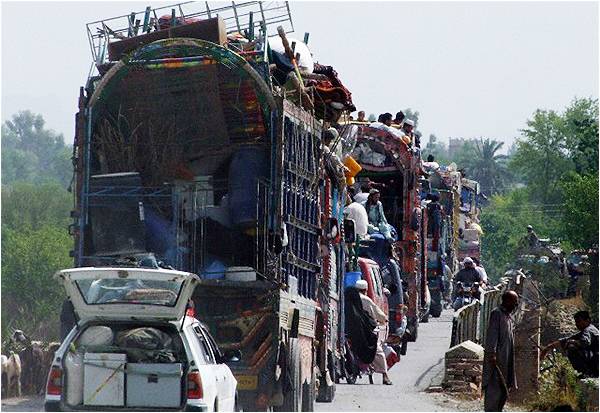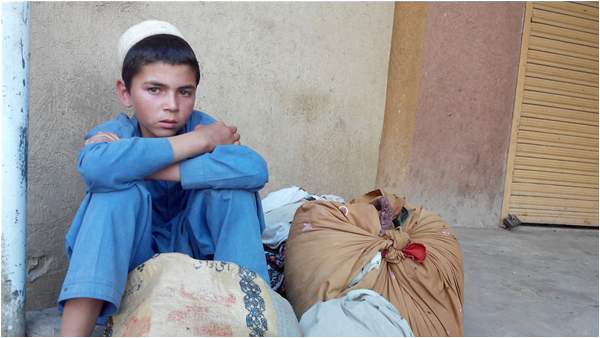
Last week when the government announced a military operation against the militants in the troubled North Waziristan region, many were taken by surprise, including the Khyber Pakhtunkhwa government.
Immediately, thousands of people started fleeing the area. According to latest estimates, the number of people who have registered themselves as Internally Displace People, or IDPs as they are commonly referred to, has reached 400,000. It is likely to rise to 600,000 in the next few days, according to Imran Khan, whose party heads the Khyber Pakhtunkhwa government. At first, there were no coordinated efforts to cope with the situation, resulting in the loss of five lives due to thirst and sunstroke on the way to Bannu. The Khyber Pakhtunkhwa government, in whose jurisdiction are the areas where most of the refugees are pouring in, asked the federal government to sit with it and devise a strategy to handle the situation. Meanwhile, the number of refugees arriving every day has lowered, and a number of NGOs have stepped in to help the government and the military take care of them.
While I was in Bannu and the Bakakhel village of the frontier regions, I saw fleeing families traveling on the main Bannu-Mirali road on foot, in tractor trolleys, buses, trucks and mini vans in a scorching 41 degrees Celsius. Some of them brought their cattle with them, traveling for days and sleeping under the open sky. I spoke to many of them – young boys, little girls, and elders with gray beards. They were exhausted by the formidable journey and the lengthy search and registration process. Almost all of them were complaining about the unavailability of transport especially for cattle. Within days, transporters have raised their fares manifolds.
[quote]Most of the organizations involved in relief efforts belong to religious groups[/quote]
The main problems of the refugees are a lack of organization in the distribution of relief goods, and a housing crisis in Bannu district. Most of the charity organizations involved in relief efforts belong to religious groups. Other charities, such as Edhi Foundation, Bacha Khan Educational Foundation and Pashtunkhwa Students Organization also have a presence, but the scope and impact of their efforts seemed much narrower. Most of these groups have set up stalls on the roadside, where they hand over sherbet and food to the passing IDPs. There is no coordinated effort to organize the availability of food and essentials and ensure all of them have access to relief goods in a transparent, fair, and sustainable way.
[quote]Bannu will find it hard to accommodate several hundred thousand new residents[/quote]
Most IDPs want to rent or share houses in the city, instead of living in government-run camps. With a population of about one million, Bannu will find it hard to accommodate several hundred thousand new residents. So far, local residents have been generous in sharing their homes with the refugees, but these arrangements may not sustain if the operation continues for too long. Relief workers believe converting local schools and colleges into IDP camps during summer could resolve the housing problems, and also make registration and coordination easier.

Amid all the mismanagement, NADRA did a remarkable job registering about 400,000 people in days. The decision by Prime Minister Nawaz Sharif to give out cash stipends instead of checks and smart cards was praised by the refugees. Many do want the government to increase the stipend – a meager Rs 7,000 per family from the federal government and Rs 5,000 from the provincial government of Khyber Pakhtunkhwa. Jamaat-e-Islami’s Sirajul Haq and noted journalist Saleem Safi have both raised this concern, saying the government must cut down the funding on infrastructure and laptop projects if it has to, to divert the money to the IDPs.
As Ramzan approaches fast, the government may have to hurry up with the measures it has planned, make the relief activities more coordinated, and allow international humanitarian organizations to work in the area. If the concerns of the refugees who have left their homes for the rest of the country are not addressed, or are addressed only by charities run by Jihadi groups, the long-term outcome of the operation will be affected.
Raza Wazir is a journalist from the Mirali town of North Waziristan
Immediately, thousands of people started fleeing the area. According to latest estimates, the number of people who have registered themselves as Internally Displace People, or IDPs as they are commonly referred to, has reached 400,000. It is likely to rise to 600,000 in the next few days, according to Imran Khan, whose party heads the Khyber Pakhtunkhwa government. At first, there were no coordinated efforts to cope with the situation, resulting in the loss of five lives due to thirst and sunstroke on the way to Bannu. The Khyber Pakhtunkhwa government, in whose jurisdiction are the areas where most of the refugees are pouring in, asked the federal government to sit with it and devise a strategy to handle the situation. Meanwhile, the number of refugees arriving every day has lowered, and a number of NGOs have stepped in to help the government and the military take care of them.
While I was in Bannu and the Bakakhel village of the frontier regions, I saw fleeing families traveling on the main Bannu-Mirali road on foot, in tractor trolleys, buses, trucks and mini vans in a scorching 41 degrees Celsius. Some of them brought their cattle with them, traveling for days and sleeping under the open sky. I spoke to many of them – young boys, little girls, and elders with gray beards. They were exhausted by the formidable journey and the lengthy search and registration process. Almost all of them were complaining about the unavailability of transport especially for cattle. Within days, transporters have raised their fares manifolds.
[quote]Most of the organizations involved in relief efforts belong to religious groups[/quote]
The main problems of the refugees are a lack of organization in the distribution of relief goods, and a housing crisis in Bannu district. Most of the charity organizations involved in relief efforts belong to religious groups. Other charities, such as Edhi Foundation, Bacha Khan Educational Foundation and Pashtunkhwa Students Organization also have a presence, but the scope and impact of their efforts seemed much narrower. Most of these groups have set up stalls on the roadside, where they hand over sherbet and food to the passing IDPs. There is no coordinated effort to organize the availability of food and essentials and ensure all of them have access to relief goods in a transparent, fair, and sustainable way.
[quote]Bannu will find it hard to accommodate several hundred thousand new residents[/quote]
Most IDPs want to rent or share houses in the city, instead of living in government-run camps. With a population of about one million, Bannu will find it hard to accommodate several hundred thousand new residents. So far, local residents have been generous in sharing their homes with the refugees, but these arrangements may not sustain if the operation continues for too long. Relief workers believe converting local schools and colleges into IDP camps during summer could resolve the housing problems, and also make registration and coordination easier.

Amid all the mismanagement, NADRA did a remarkable job registering about 400,000 people in days. The decision by Prime Minister Nawaz Sharif to give out cash stipends instead of checks and smart cards was praised by the refugees. Many do want the government to increase the stipend – a meager Rs 7,000 per family from the federal government and Rs 5,000 from the provincial government of Khyber Pakhtunkhwa. Jamaat-e-Islami’s Sirajul Haq and noted journalist Saleem Safi have both raised this concern, saying the government must cut down the funding on infrastructure and laptop projects if it has to, to divert the money to the IDPs.
As Ramzan approaches fast, the government may have to hurry up with the measures it has planned, make the relief activities more coordinated, and allow international humanitarian organizations to work in the area. If the concerns of the refugees who have left their homes for the rest of the country are not addressed, or are addressed only by charities run by Jihadi groups, the long-term outcome of the operation will be affected.
Raza Wazir is a journalist from the Mirali town of North Waziristan

